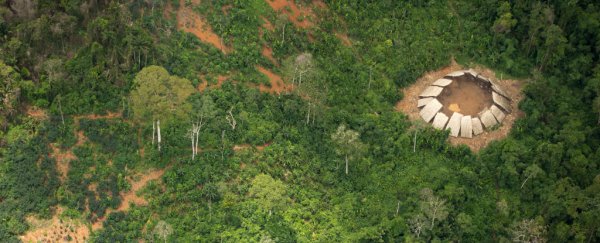A series of new aerial photographs have given us the first glimpse of uncontacted tribe in the Brazilian Amazon in more than a year, easing fears from indigenous rights and conservation groups that the increase of illegal mining in the area might have seriously threatened their existence.
Amazingly, since the last sighting of the Moxihatetema tribe, it appears to have grown by two families, but researchers are concerned that the settlement has been moving closer than ever to miners who could introduce deadly viruses, contaminated food and water, or even guns to the fragile community.
The tribe of 100 or so people is one of three Yanomami groups of indigenous people living in the Yanomami Reserve - a vast area of dense rainforests and mountains in northern Brazil and southern Venezuela.
Covering over 9.6 million hectares, the Yanomami territory in Brazil is twice the size of Switzerland, and their population totals roughly 22,000 in Brazil and 12,000 in Venezuela.
Since efforts to contact the Moxihatetema tribe directly have been met with resistance, their progress and safety have been monitored from the air.
 © Guilherme Gnipper Trevisan/Hutukara
© Guilherme Gnipper Trevisan/Hutukara
 © Guilherme Gnipper Trevisan/Hutukara
© Guilherme Gnipper Trevisan/Hutukara
While this extreme isolation has protected the Moxihatetema from diseases such as malaria, their settlements can be difficult to locate from above the thick of the rainforest.
This time, it took more than a year to locate the roving village, and all the while, experts feared that invasions by garimpeiros - illegal miners - had seriously compromised the community.
"The Moxihatetema are at great risk," Davi Kopenawa Yanomami, president of the Yanomami association, Hutukara, told The Guardian.
"But it is not just them. It is all the Yanomami people in the region. There are more garimpeiros every year. They do not respect our territory. The government must do more to prevent them from invading our land."
Just to give you an idea of how serious a threat these garimpeiros actually are to some of the most isolated and ancient human societies on Earth, in 1993, miners murdered 16 Yanomami people - many of them infants, children, and the elderly - just outside Haximu in Brazil, and burned their village to the ground.
Known as the Haximu massacre, it's not clear what triggered this particular conflict between the Yanomami and the miners, but it marked the beginning of a very serious threat brought on by the 1987 gold rush in Brazil.
While the Moxihatetema people live in government-protected parts of the Brazilian rainforest, according to indigenous rights group Survival International, the area is being over-run by over 5,000 illegal gold miners.
"They are like termites - they keep coming back and they don't leave us in peace," Davi Kopenawa Yanomami told the organisation.
The concern now is that, due to budget cuts from the local government, protection for the Moxihatetema and other tribes in Brazil could diminish, with the National Indian Foundation (or Funai) experiencing one of the most severe cuts in recent months.
"Funai closed its field base in this region last year, effectively abandoning the Moxihatetema to their own fate," Fiona Watson of Survival International told Jonathan Watts at The Guardian.
The only sliver of hope is that the tribe actually appears to be growing, with the images below revealing that two more thatched roofs have been added to the circular communal house since the last time it was spotted - a good sign that outside diseases have not impacted on the small community.
The release of the photographs could be seen as a violation of the privacy of this isolated community, but researchers are hoping they will bring more widespread awareness of the threats they face, and the desperate need for better controls on illegal mining in the area.
"These extraordinary images are further proof of the existence of still more uncontacted tribes," Survival International director, Stephen Corry, said in a press release.
"It's obvious that they're perfectly capable of living successfully without the need for outside notions of 'progress' and 'development'. All uncontacted tribal peoples face catastrophe unless their land is protected. We're doing everything we can to secure their land for them, and to give them the chance to determine their own futures."
 © Guilherme Gnipper Trevisan/Hutukara
© Guilherme Gnipper Trevisan/Hutukara
 © Guilherme Gnipper Trevisan/Hutukara
© Guilherme Gnipper Trevisan/Hutukara
